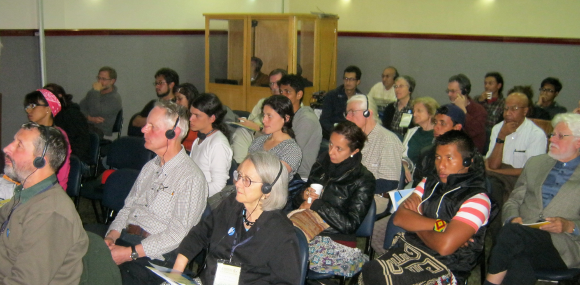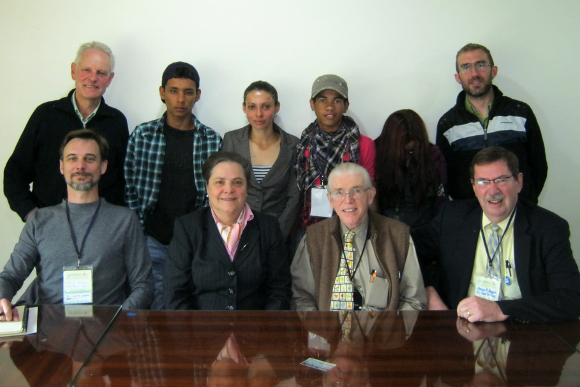ACOOC’s Strategy and Conference Activity
Acción Colectiva de Objetoras y Objetores de Conciencia (ACOOC), our conference host, is struggling with some of the problems Colombia is facing, particularly with batidas and with its confused conscientious objection policy (see ’s Picket Line for details).
Before the conference started, I met with the remarkably energetic, enthusiastic, and personable Milena Romero of ACOOC at the group’s headquarters in Bogotá, and she filled me in on what the group is doing.
ACOOC is run out of a small set of offices that also includes a small café, a conference room for rent, a print shop, and a computer refurbishing center. These help make the organization financially self-sustaining.

“Staffed by objectors” reads the mural outside the ACOOC café and print shop
When I was there, there were eight or ten other people on-site, some brainstorming a video and/or direct action project. They were all about as young as the youngest person at a typical war tax resistance gathering in the United States, but perhaps this is to be expected as there is an ongoing military draft in Colombia, and so the issue hits young men viscerally.
It is a tribute to the open-mindedness and curiosity of the group that they hosted this conference, since their own urgent focus is on protecting conscripts and conscientious objectors. Tax resistance isn’t really on the radar here yet, being mostly crowded out by these priorities. The group hoped that the conference could help them, and other activists with a similar focus, to learn about war tax resistance. They also wanted to use the opportunity to confer with other activists about the status of the struggle to legalize conscientious objection to military service, and to capitalize on the gravitas of an “international conference” to add weight to their lobbying efforts.
ACOOC’s Strategies
The group has designed and is vigorously implementing a set of strategies:
- document batidas, and be a credible source of information about them for the press and for human rights authorities
- push for legislation that would regulate in a predictable and beneficent fashion the process of applying for conscientious objector status
- help conscientious objectors who have been drafted to navigate the judicial system in the absence of such a law
- erode the military ID requirement
ACOOC is also trying to win a public relations struggle. Because of years of trouble with paramilitaries, guerrillas, and the drug war, people in Colombia tend to prioritize security and in particular security through superior force of arms. Public opinion is not very sympathetic to arguments for principled nonviolence. So ACOOC is moving slowly and trying to make conscientious objection non-threatening to a security-focused society. At the same time they’re also trying to satisfy the radical wing of conscientious objectors who are attracted to their cause and who want to make sure they won’t be left out in the cold by compromise.
Proposed Legislation Legalizing Conscientious Objection
A bill that would formally legalize the conscientious objection process is working its way through the legislature. It passed the Colombian Senate unanimously, but the military is hostile to it and it is expected to face serious opposition in the House. The Constitutional Court is also expected to weigh in at some point (apparently, unlike in the U.S., that court sometimes reviews proposed legislation for constitutionality before the legislation passes through the legislature).

Conferees (wearing simultaneous-translation headsets) listen to Ciro Roldán, Alan Vargas, and Nicolás Navas from the Universidad Nacional de Colombia discuss the state of conscientious objection to military service in Colombia on the opening day of the conference.
Part of ACOOC’s strategy regarding this legislation has involved walking a fine line on the issue of abortion. Abortion is illegal in Colombia, but the courts have ruled that it is permissible in the case of rape, severe fetal deformity, or danger to the life of the mother. Conscientious objectors to abortion in the medical profession have sought legislative protection of their right not to participate in such abortions, and sections that permit such conscientious objection are wrapped into the conscientious objection to military service bill. ACOOC has been working with a women’s rights group to make sure the bill doesn’t go so far in this area as to lead to opposition from the abortion rights movement. This part of the bill may be key to gaining sufficient support from Catholic conservatives in the House to pass the bill over broader conservative opposition.
ACOOC has also had to strike a balance between the sort of compromise that has a chance of passing in the legislature and the concerns of some of its more radical base, many of whom are skeptical of government outreach or believe the legislation does not offer sufficient protection to conscientious objectors. Even the anarchists I spoke with, however, were willing to hold their noses and speak politely with the politicians they needed to lobby, saying they could put their politics aside temporarily in the hopes that the legislation would offer concrete help to draftees.
The law would require conscientious objectors to do 15 months of alternative service. Some of this might be in civil defense agencies also run by the ministry of defense (such as agencies roughly equivalent to FEMA in the U.S.). Some objectors balk at such service (the same was true in the U.S. where some drafted objectors felt okay about joining civilian service camps to do alternative service, and some refused).
ACOOC is not completely happy with the legislation, and has a list of changes that it hopes to implement, either by additional legislation or by means of judicial challenges, after the bill passes, but it feels that the best way forward at this point is to try to pass the legislation as written.
The military has been lobbying to change the legislation in hostile ways: for instance with provisions that would force objectors to apply for conscientious objector status before a panel made up only of people representing the defense department, or that would force objectors to pay a fine in order to get conscientious objector status.
ACOOC is lobbying to water down the first of these proposals, insisting on a civilian representative on the panel. It’s keeping more quiet about the second proposal, though, recognizing that in the court of public opinion the military has a strong argument that if a non-objector may be forced to risk his life, a conscientious objector ought to be forced to put some skin in the game. However they are aware of the case of Alfredo Díaz Bustos in Bolivia (a regional human rights body ruled that Díaz could not be forced to pay a fine there in order to get conscientious objector status) and expect that if the second provision passes they may be able to challenge it on similar grounds.
Executing an Outreach and Lobby Plan
At the conference we heard of much about the efforts to get this bill passed (and about ACOOC’s other strategies), and we also helped to implement some of it. One afternoon, conferees broke up into three groups to plan visits (two each) the following day to the following:
- the office of the UN High Commissioner for Human Rights in Colombia
- the Defensoría Del Pueblo (ombudsman) in Bogotá
- the Ministry of Defense’s Human Rights Office
- the headquarters of the Polo (left-wing coalition) Democratic Party
- the office of Green Party congressional representative Alfonso Prada Gil
- the government’s director of human rights & the district secretary
For participants in each of these meetings, ACOOC had prepared a sheet in English and Spanish briefly describing why they considered it important to communicate with that particular office, and what specifically the offices should be asked to do about ACOOC’s concerns. Our teams met to discuss our strategies for the meetings, and the next morning went out to the previously-arranged appointments.
The following day, each team reported to the group at large about the results of the meeting, both telling us the “feeling” they had about how the meeting went, and any specific action items or promises agreed to by each side.
This I felt was very well-designed and -executed and seems likely to have practical results.
I was part of the group that met with Clara López, former mayor of Bogotá and now head of (and presidential candidate of) the Polo Democratic Party. She promised her party’s support for the upcoming conscientious objection legislation, and also told us that she’d been at Radcliffe in the U.S. during the Vietnam War and had been active with Students for a Democratic Society working to protect draft evaders and to chase ROTC out of Harvard back in the day. She told us she had been a war tax resister for a few years but relented in the face of ruinous fines. Now, as a wealthy Colombian, she pays a “patrimonio” tax that is explicitly labeled a “war tax.”

The team meeting with Clara López at the Polo Democratic Party headquarters in Bogotá (she’s second from the left in the front row).
